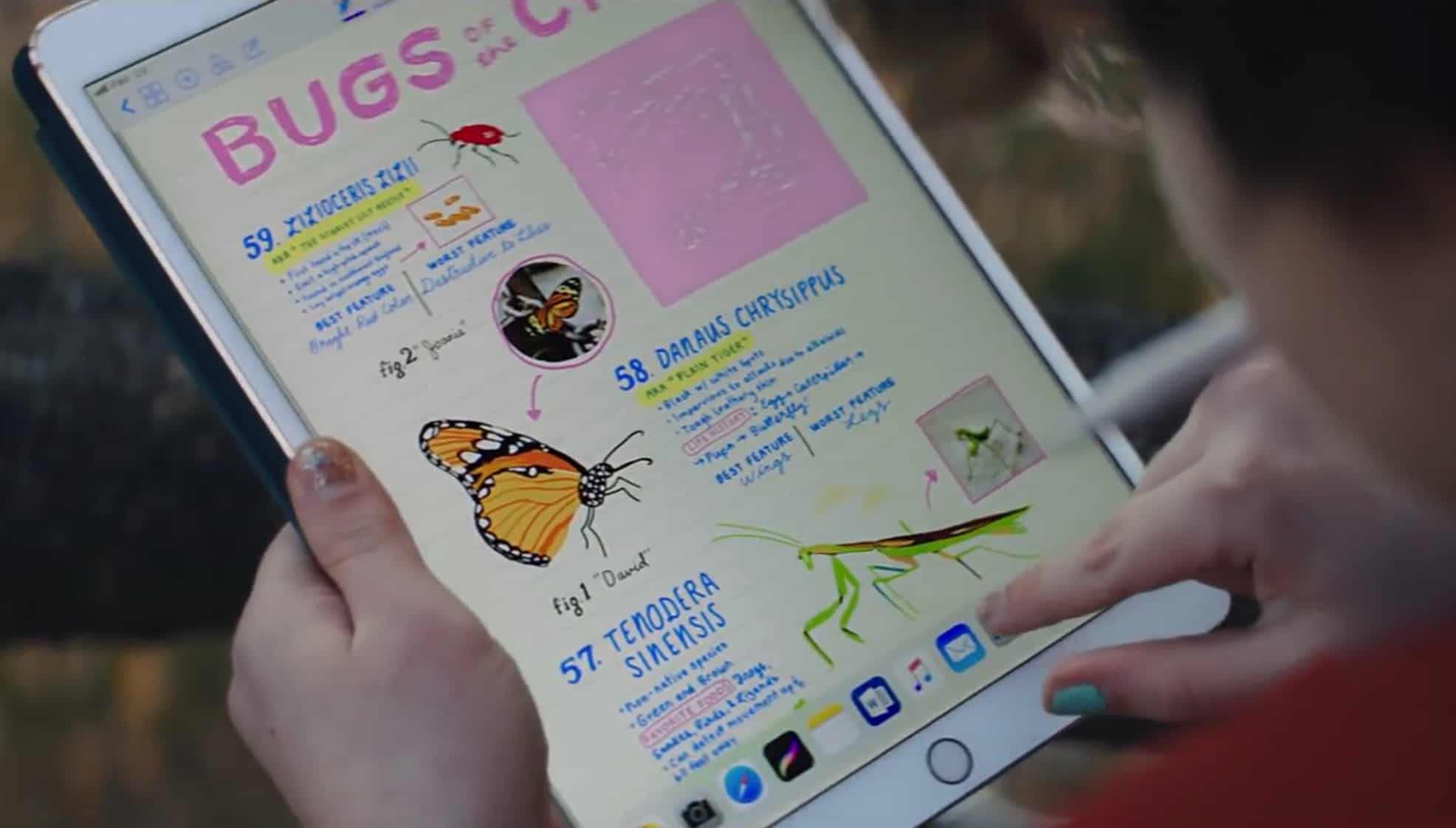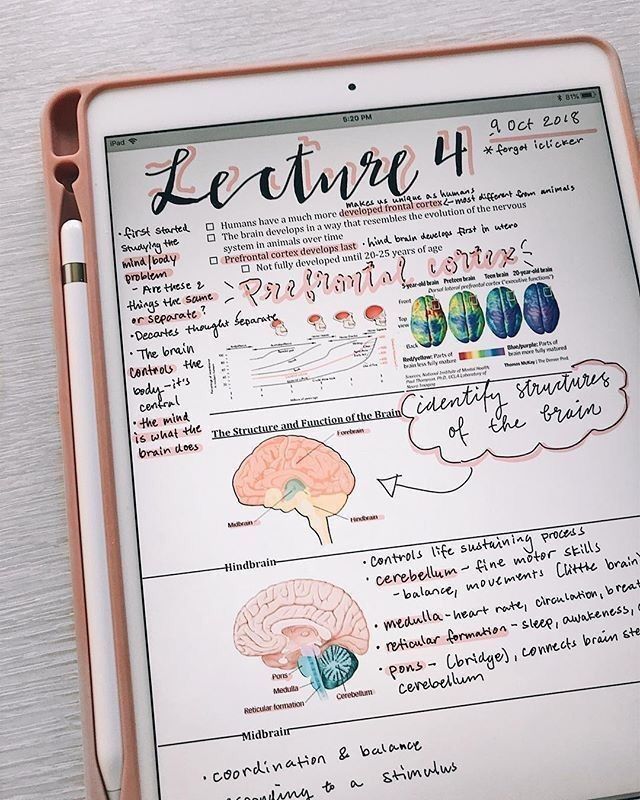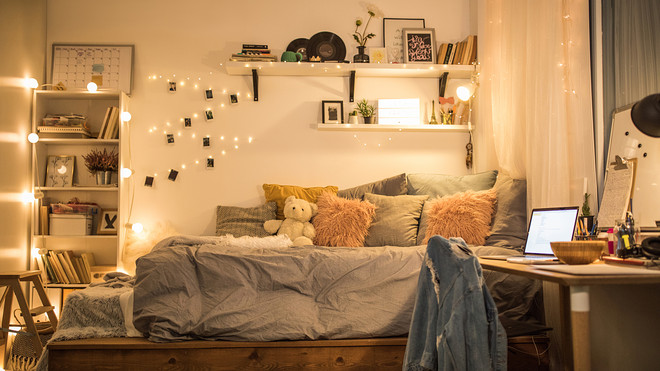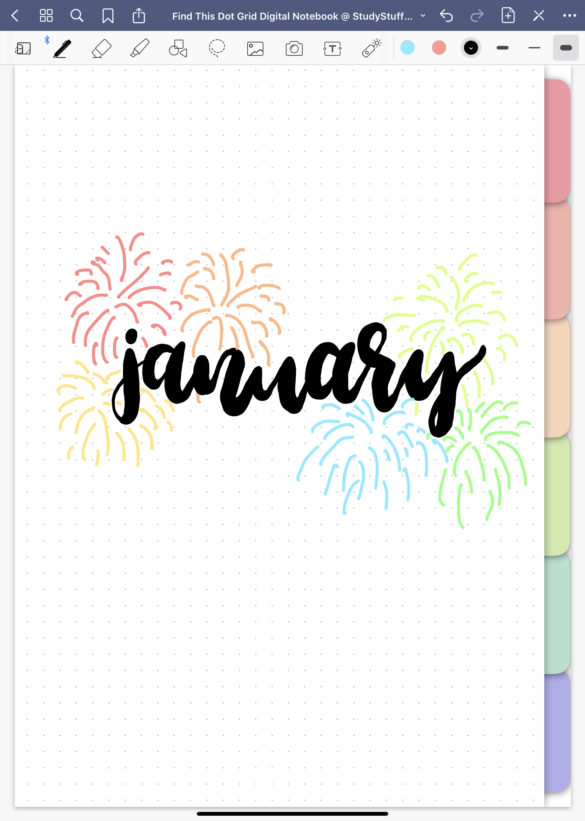
The 16 Best Tips To Be Super Organised For School
There are three main areas that you need to address to become organised for school. You need to organise your stuff, organise your time and organise your space. If you adopt some of the strategies for each section below you will definitely become more organised for school.
Organise your stuff
1. Use a binder/folder organising system
The system that I use involves a small binder that I carry around daily and multiple large binders (one for each subject) that I leave at home. In my smaller binder I have colourful dividers that separate sections for each subject. I don’t use workbooks/notebooks as most of my work is online however I do have loose leaf lined paper that I use for making physical notes. Whenever I get a new worksheet or hand out I hole punch it and place it in the colour coded section for that subject. As we move onto a new topic at school/these notes and worksheets become irrelevant I file them away in my large binders at home. This is a great system for organising and also to keep the weight of your bag down.
2. Offload things you no longer need to carry around
I suggest that you do some filing once a week so you only carry what is relevant to school each day. Friday night is a good time to do this so the binder that you take to school each day is ready to go on Monday.
3. Organise your stuff by subject
This is a more simple organisation technique however it is very effective. Organise everything by subject. This means your notebooks, folders, binders and even your school work digitally. Make folders on your laptop for each subject and then sub folders within those for topics.
4. Pack your bag the night before
If you often find yourself rushing in the morning to get to the bus, train station or car I suggest that you pack everything that you can the night before. Look at your timetable and put the relevant materials in your bag for what subjects that you have. Leave essentials that you use daily in your bag so you never have to worry about them e.g. your pencil case and calculator.
The other option is to use my small binder organisation system. The best thing is that the binder has every subject in it so you don’t need to worry too much about carrying what you need to school everyday as it is already in your binder.
Now that you have your bag ready the night before all you need to do in the morning is put your lunch inside and a water bottle and your ready to go!
Organise your time
1. Use a planner
The best way to organise your time is to start using a planner. If you like digital planning I highly suggest using a digital student planner with hyperlinked tabs for an iPad/tablet or if you prefer physical paper planning I suggest you use a daily planning printable template. These templates are great to be used in a binder or can even be used digitally by handwriting over them with a stylus or adding text boxes.
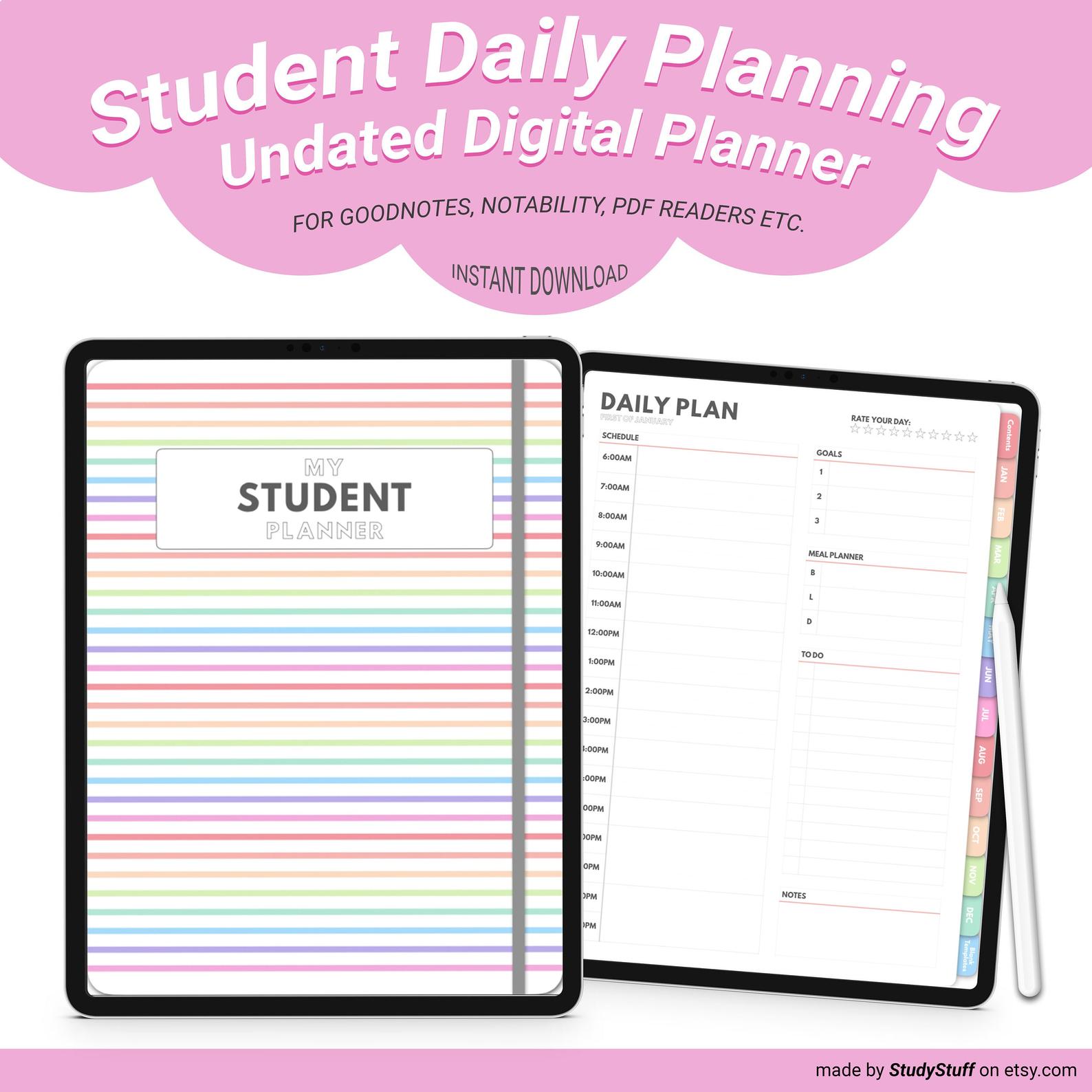
2. Set aside five minutes daily to plan
To effectively plan your day I suggest that you identify 3 goals that you want to achieve for the day. Then make a to do list and organise your to dos in a schedule. Planning your day by time increments that you find in a schedule is really effective as it gives you purpose in your day, leaving you time to do what you want and not waste time thinking about what you could do.
Here is a screenshot of a daily plan page from my digital student planner on my iPad:
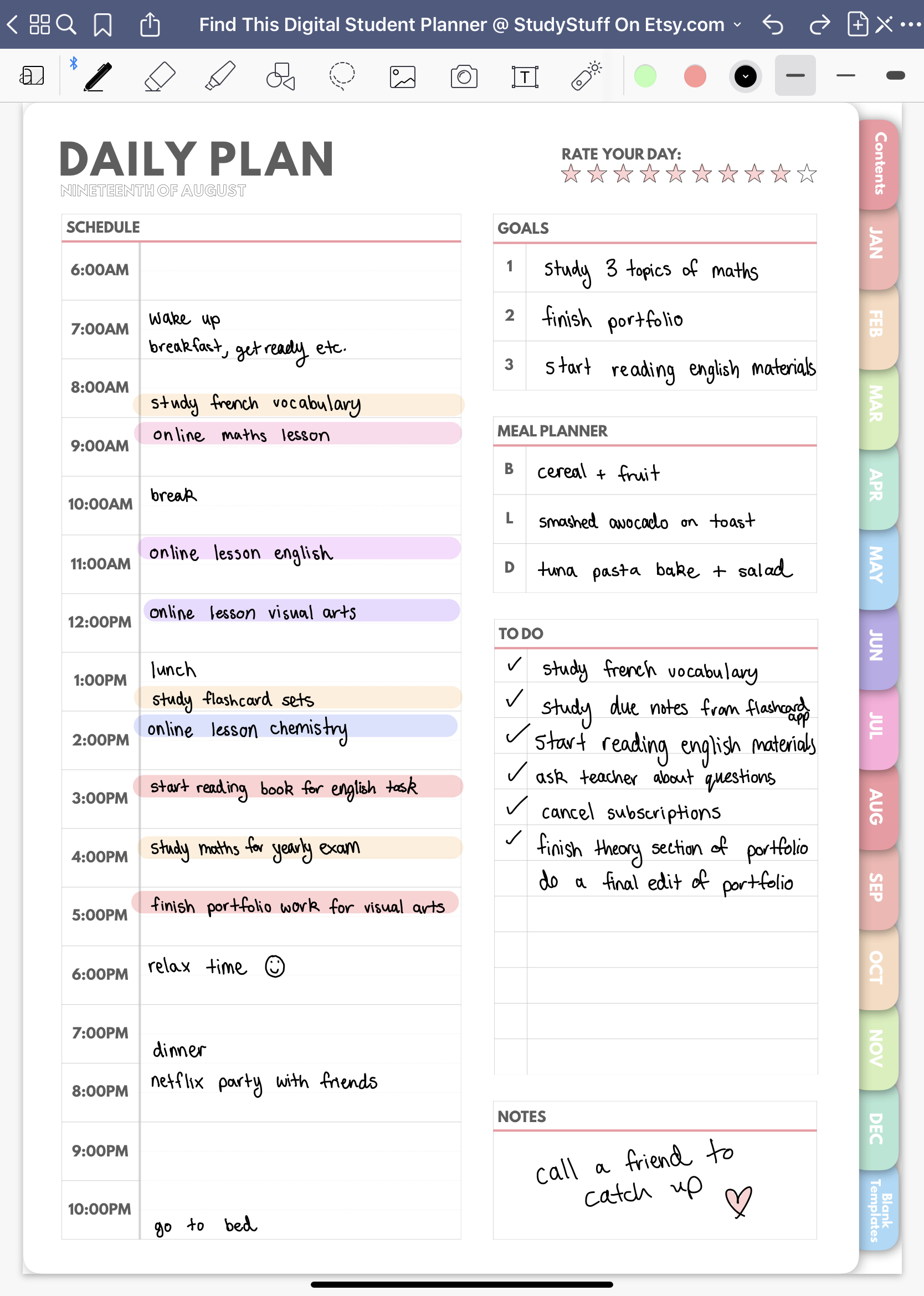
As you can see I have defined 3 goals for the day, meal planned, made a to do list and then scheduled my to dos. At the end of the day there is a really fun rate of activity where you can colour in stars to indicate how good your day was. As you can see my day was pretty good, I rated it 9/10 because I felt like I was productive and achieved nearly everything that I set out to!
3. Make a routine
Creating a routine to follow everyday can make you much more organised for school. This could be a morning routine, travel routine or a night routine. For example I have a morning routine where I wake up at 7am, eat breakfast, get dressed, brush my teeth, make my lunch, check that I have everything in my bag and then leave to walk to the bus stop. My travel routine is doing a little bit of study on the bus with digital flashcards or reading a book for school. If you are interested I suggest that you read my article on how to study flashcards with the leitner system here. Creating a routine can make you much more organised as you will know exactly what to do and will also make you more productive.
4. Create deadlines before the actual deadline
If you struggle with organising your time and you find yourself often cramming for exams (I have a full article that you can read on how to stop cramming for exams here if you want more advice) or are often finishing assignments last minute I suggest that you create deadlines before the actual deadline. For example, you might have a visual arts theory essay due on the 16th of September. Instead of thinking that it’s due on the 16th of September make a due date that is a full week before that, so the 9th of September. This will force you to do the assignment much earlier instead of leaving it to the last minute. Even though you know you have an extra 7 days after that it gives you a goal to work towards and if something goes wrong you have the extra time to fix it up.
5. Double check that you’ve completed all the homework that is due tomorrow
Before you go to bed or after you have finished your homework for the evening check that you have completed everything that is due tomorrow. You should be writing your homework due dates in your planner or you can use a printable homework tracker template to keep a track of it all in one place. If you do realise that you haven’t finished it all you have the option to stay up a bit later and finish it or get up earlier the next morning which leads to my next point…
6. Wake up a little earlier each morning
This may seem like a struggle because everyone likes to get as much sleep as they can but waking up even only 10 minutes earlier each morning can be super beneficial to your routine. You can achieve a lot of things in that extra 10 minutes which can make you much more organised for school.
7. Focus on a single task, don’t multitask
If you want to be more organised for school, in particular for completing assignments and studying, you should focus on one task at a time and avoid multitasking. For example if you are studying maths or doing your maths homework you should fully focus on the task at hand. This means that you don’t have your favourite tv show or a YouTube video running in the background. Contrary popular belief it is very hard to properly multitask and it can significantly reduce your productivity. If you struggle with maintaining focus while studying I suggest you try the pomodoro studying technique, you can find out more by reading my article on it here.
8. Use sticky notes as reminders
Another really effective way to get organised for school is to use sticky notes as reminders. You can write all of your to dos on them and stick them around your study space to act as a constant visual reminder that you need to complete something.
9. Use time blocking in a calendar
Time blocking is a time management technique where you make ‘blocks’ in your calendar to divide up your day. It can help you visualise when you are busy and when you are free to organise your day around it. You would usually do it on a digital calendar so you have the freedom to change your schedule and also so you get reminders. I like to do time blocking with google calendar or Apple calendar.
For example you would create recurring events such as your classes, transportation, sport etc. in your calendar. You would then plan your day around those events, making single one off events in the blank spaces in your calendar.
10. Break down big tasks into smaller tasks
My last tip for becoming organised for school is to plan out all of your assessment tasks, assignments and exams by breaking down these large tasks into smaller, more manageable tasks. I really like doing this using my assessment action plan template which you can find in my digital student time management planner or my digital daily planning student planner.
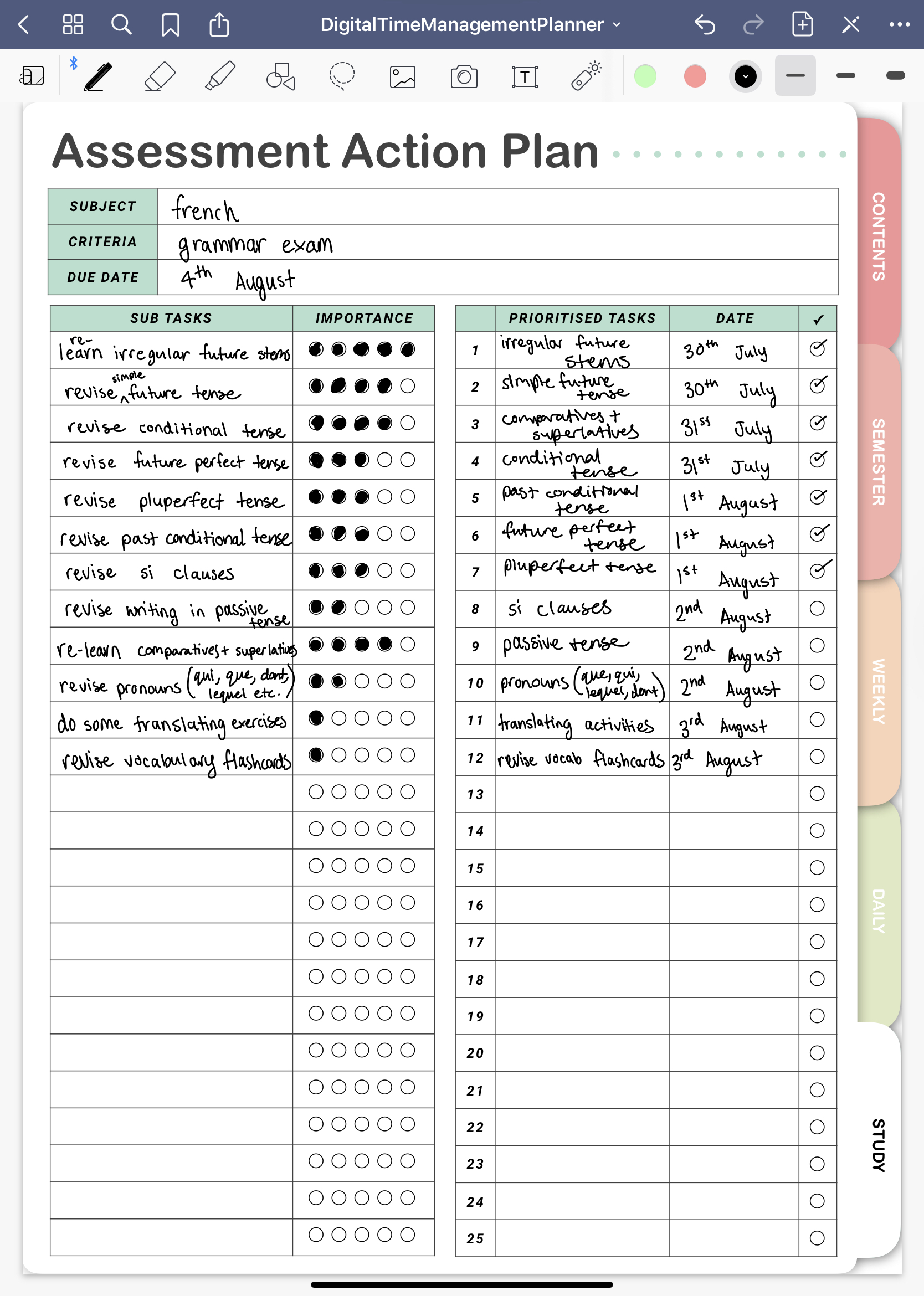
As you can see from this screenshot of my student time management planner I have created a master to-do list, listing everything that comes to mind that I have to do to complete the assessment. I try to make the to-dos things I can achieve in a relatively short amount of time like 15 to 20 minutes. I then rate the importance of each sub task and then order them in a new list in order of importance. Next I schedule each task by giving it a date to be completed on.
Organise your space
1. Declutter your study space
To be more organised for school you should declutter your study space. You can do a little clean each day once you have finished your work or at the end of the week. Organising your space will help you focus as you will have less distractions and also help you in the fact that you will know where everything is.
2. Keep only the essentials for the task you are doing on your desk
While you are studying you should only keep the necessities for what you are studying on your desk. For example, if you are studying English only have a notebook or laptop, minimal stationery and your English text on your desk. This can help you focus on the task at hand and be more productive.
Before You Go!
Are you interesting in learning how to take extremely effective notes?
Be sure to read my article on the 5 best note taking strategies here!
Looking For A Tapestry For Your Dorm Room But Have No Idea What Size To Get? Dorm rooms are on average …
If you take notes using your iPad, you need to know these 12 iPad note taking tips! They will make …
Yes, an iPad is worth it for note taking, especially if you are going to make the most out of …
Going shopping for your dorm room but you are not sure what essentials to buy? Essentials for a dorm room include …
To make a digital bullet journal you firstly need to decide what platform you are going to use. Most people …
To make studying a habit you should commit to it for at least thirty days, put your study goal in …


